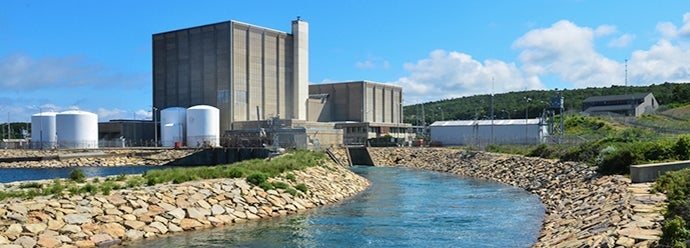The nine-state Regional Greenhouse Gas Initiative consortium has settled on a proposed update to the cap-and-trade program that would call for a 30 percent reduction in carbon pollution from the region’s power plants by 2030.
The proposed changes would set a regional cap of 75,147,784 tons of carbon dioxide emissions in 2021 and then reduce that cap by about 3 percent per year, resulting in 2030 emissions 30 percent below 2020 levels, according to RGGI. The proposal also makes changes to RGGI’s emissions allowance auctions for power generators.
“The bipartisan agreement announced today by the Regional Greenhouse Gas Initiative demonstrates the collaborative regional approach to addressing climate change in the Northeast and Mid-Atlantic, and positions Massachusetts and other member states to meet important greenhouse gas reduction targets,” Massachusetts Department of Environmental Protection Commissioner Martin Suuberg said in a statement.
The 2008 Global Warming Solutions Act requires Massachusetts to achieve greenhouse gas emissions reductions of 25 percent below 1990 emissions levels by 2020 and a reduction of at least 80 percent by 2050. As of 2014, the state had reduced emissions by 21.3 percent from 1990s levels, according to the most recent data available from DEP.
Gov. Deval Patrick, with support from the Legislature, entered Massachusetts into the regional RGGI compact shortly after he took office in 2007, touting the voluntary, market-based regulatory program’s ability to reduce greenhouse gas emissions and provide funds for energy efficiency investments. The agreement set carbon reduction goals for the region through 2020, but requires an extension to keep the program running beyond that.
The Sierra Club said RGGI has been an “unquestioned success” since it began, helping New England and the mid-Atlantic outpace the rest of the country in carbon emissions reduction, contributing to a 3.4 percent reduction in electricity rates, and supporting $2.7 billion in regional economic growth.
The Conservation Law Foundation said RGGI has “resulted in a multitude of benefits, including creating thousands of jobs, saving customers more than $600 million on their energy bills, and preventing thousands of asthma attacks.”
Basil Seggos, the commissioner of New York’s Department of Environmental Conservation, said that by 2030, with the changes proposed Wednesday, “the RGGI states will have reduced the emissions cap 65 percent from 2009 levels, far ahead of goals set in the Clean Power Plan or the Paris Climate Accord.
The nine RGGI states will seek public comments on the proposal at a hearing in Baltimore on Sept. 25. Then the group will conduct additional economic analysis, publish a revised proposal and each individual state must follow its own statutes to implement the new RGGI plan.
Though many environmental groups were supportive of Wednesday’s RGGI proposal, there had been lobbying efforts to get the states to agree to more aggressive emission reductions. In February, more than 130 state lawmakers, academics and business leaders sent a letter to Gov. Charlie Baker urging him to push the other RGGI states to agree to an annual 5 percent reduction in the carbon dioxide cap, which would have represented a doubling of the current rate of decline.
In a statement, the Sierra Club lauded the nine RGGI states — Connecticut, Delaware, Maine, Maryland, Massachusetts, New Hampshire, New York, Rhode Island and Vermont — for working together on a critical issue amid “the current disastrous policies and rhetoric of the Trump Administration.”
“More clean energy and stronger pollution limits are overwhelmingly popular and mean more jobs, cleaner air and healthier communities,” Mark Kresowik, eastern region deputy director for the Sierra Club’s Beyond Coal Campaign, said in a statement. “This is just a first step toward meeting the commitments to climate protection these states have made, and we look forward to working them to implement this proposal and ensuring greater support for communities overburdened by pollution and underserved by economic opportunities.
CLF, which often does not see eye-to-eye with state government on environmental policy, also praised the RGGI announcement Wednesday, saying the new proposal will further strengthen the program.
“For nearly a decade, RGGI has been a sterling example of the positive impact such collaboration can have on both the environment and the economy, and today’s new commitments represent a significant contribution to our work to leave a cleaner and safer home for future generations,” CLF attorney Phelps Turner said in a statement.
The Union of Concerned Scientists applauded the proposal, but also called upon states to take action beyond participation in RGGI, especially to deal with the carbon dioxide and other types of emissions from vehicles.
“While this initiative moves us closer to a clean energy economy, more needs to be done. Climate change and its resulting impacts are worsening at an alarming pace, and strengthening RGGI does not address the largest source of emissions in the region — the transportation sector,” Ken Kimmell, president of the Union of Concerned Scientists, said in a statement. “We encourage these same states to build upon the success of RGGI and set their sights on a regional solution to transportation sector emissions.”
Earlier this month, Energy and Environmental Affairs Secretary Matthew Beaton acknowledged that Massachusetts will not meet the 2050 requirements of the GWSA unless the state does more to address emissions from the transportation sector. The transportation sector is the single largest producer of greenhouse gas emissions in Massachusetts, according to DEP, accounting for 40.8 percent of such emissions in 2013.
“The whole world right now is wrestling with the transportation sector and the challenges around dealing with it relative to climate mitigation. We’ve been in a number of conversations about identifying solutions for transportation, whether it’s done on a regional basis,” Beaton said in a briefing with reporters. “It is a big challenge. We recognize that challenge, we see it as a challenge as well.”

